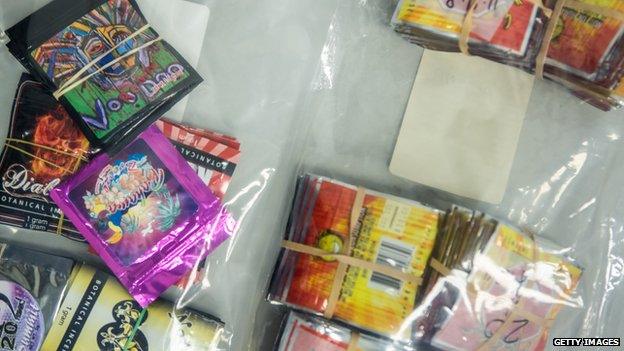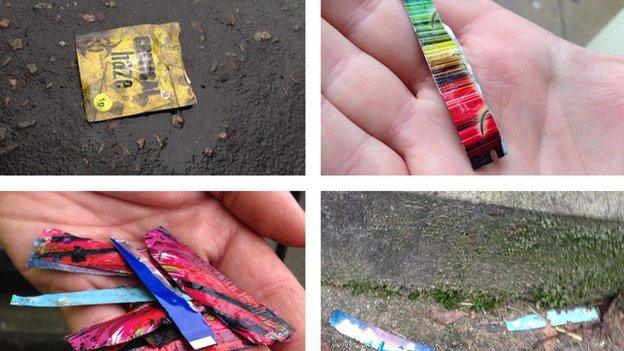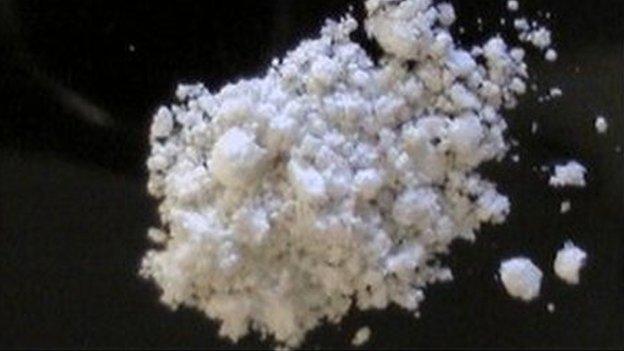Legal highs set to be banned in Lincoln city centre
- Published

Lincoln had the highest rate of police incidents involving legal highs in 2014
Lincoln city centre could become the first place in the UK to ban legal highs.
The local council there will vote to decide if they're going to back proposals to stop people form using them in public places.
The plans were first suggested last year and could come in to force on 1 April.
It would be the first ban of its kind in the UK.
Sam Barstow from City of Lincoln Council said: "This is a part of a whole raft of measures that include further education, increasing our intelligence around legal highs and the issues that are associated with them."
But Jamie, who has sent a petition to the Prime Minister asking for a clamp down on legal highs in the UK, told Newsbeat more should be done.
He thinks the rules should go further and wants head shops, which sell legal highs, to be closed down.

The number of incidents involving legal highs in Lincoln increased from 7 to 820 between 2010 and 2014
"It's just the advertising it gets. You walk down the high street and there's 10-year-old kids walking down the street and there's a big pipe in a shop window. What message does that send out?"
The reason the government struggle to make legal highs illegal is because as soon as they ban one substance a few chemicals are changed and it is rebranded as a whole new product.
Lincoln's new rules are being suggested as a replacement of Designated Public Place Orders, which prevent alcohol consumption under certain circumstances.

"You wouldn't have noticed [legal high use in the city] five years ago," said Jamie.
"But more recently you can see people just staggering up and down the high street almost like zombies - absolutely off their face."
He took legal highs once but says they have had a much worse affect on some of his friends.
"A few people I did know have carried on doing it and I've watched them become homeless and they look nothing like they used to.
"They're just staggering up the high street, they sleep on the streets now, under bridges."
Sam Barstow, Lincoln's service manager for public protection and anti-social behaviour, said: "The main difference between the existing powers and this new proposal is that it gives us the ability to tackle on-street alcohol consumption and the use of so-called legal highs.
"The Designated Public Place Order required police to be satisfied consumption of the alcohol would lead to anti-social behaviour, which led to difficulties in enforcement.
"The new order would be a complete ban on consuming both alcohol and legal highs in the city centre."

What are legal highs?
Legal highs are substances which produce the same, or similar effects, to drugs such as cocaine and ecstasy, but are not controlled under the Misuse of Drugs Act.
In many cases, they are designed to mimic class A drugs, but are structurally different enough to avoid being classified as illegal substances, so it is legal to possess and use them.

The latest figures from the Centre for Social Justice (CJS) show the number of police incidents involving legal highs have increased in many parts of England since 2010.
The number of incidents soared across 16 police forces that responded to a freedom of information request by the think-tank.
Of those asked, Lincolnshire police recorded the highest rate of police incidents involving legal highs in 2014 with 820.
The second highest was South Yorkshire with 465 and West Yorkshire's 324 was third highest.

MDAI, which replicates ecstasy, has been banned on The Isle of Man since 2011 but is illegal in the UK
The CSJ has called for a robust response from the Government, including new police powers to close shops that persist in selling legal highs.
It also claims the number of deaths associated with the use of legal highs increased from 12 in 2009 to 97 in 2012 in England and that the UK has the highest number of legal highs users amongst young people in Europe.
"As well as posing worrying health risks, these figures suggest legal highs are placing an increasing burden on public services," said senior CSJ researcher Rupert Oldham-Reid.
"It is too easy for people to walk into high street shops and buy these drugs - many of them as dangerous as class A substances.
"If we want to start responding to the problems caused by 'legal highs' we need to clamp down on those making a living out of selling them."
The CSJ wants the Government to implement legislation similar to a scheme run in Ireland, where authorities slashed the number of 'head shops' from more than 100 to less than 10.
The number of police incidents involving legal highs in England
Follow @BBCNewsbeat, external on Twitter, BBCNewsbeat, external on Instagram and Radio1Newsbeat, external on YouTube